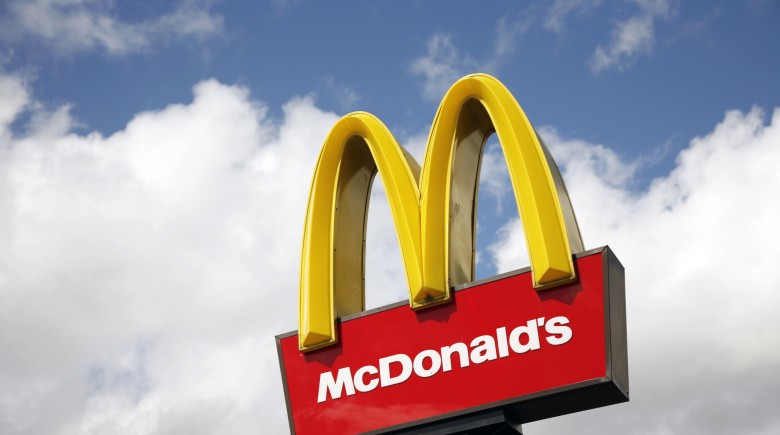That’s right, the McDonalds double cheeseburger, often found in the $1 section of their menu is being hailed as the best food ever invented. And as you might imagine, some people are not amused. A reader of the Freakonomics.com blog wrote in with this proposition:
It has been my gut-level (sorry, pun) feeling for a while now that the McDonald’s McDouble, at 390 Calories, 23g (half a daily serving) of protein, 7% of daily fiber, 20% of daily calcium and iron, etc., is the cheapest, most nutritious, and bountiful food that has ever existed in human history.
That was a few months ago, and the folks over at Freakonomics liked the comment so much that they have highlighted it in a blog post and even did an entire pod cast on the subject. Now, instead of the story fading quickly in the internet monster’s maws, it seems to be picking up a bit of steam. Kyle Smith at the N.Y. Post seems to be gleefully dumping gasoline onto the fire, by tweaking the naysayer’s of this McDouble controversy, or maybe it’s more accurate to say argument:
The outraged replies to the notion of McDouble supremacy — if it’s not the cheapest, most nutritious and most bountiful food in human history, it has to be pretty close — comes from the usual coalition of class snobs, locavore foodies and militant anti-corporate types.
He goes on to make some very good arguments about the cost of being one of those organic, farmer’s market types and how that would be a lifestyle nearly impossible to replicate for poor people. It’s all good fun and I encourage you to read the whole thing. But what I found especially interesting were some of the tidbits of information that have come to the fore because of this McDouble publicity. Here’s one:
But we all know fast food makes us fat, right? Not necessarily. People who eat out tend to eat less at home that day in partial compensation; the net gain, according to a 2008 study out of Berkeley and Northwestern, is only about 24 calories a day.
Doesn’t that make sense to you? I know that certainly mirrors my behavior. If I am planning to eat out at night I tend to just naturally eat less during the day. Obviously, that doesn’t always stand true, but generally speaking, I think unconsciously if not always purposefully, pigging out at lunch for example, just doesn’t seem appealing knowing you are going to dinner that night. Even just picking up some fast food for lunch or dinner (oh, c’mon — I know you’ve done it) usually equates to less snacking or at least less calories in your next meal.
Another item highlighted is that a study purportedly showed that junk food costs about $1.76 per 1,000 calories. Isn’t that amazing? It makes one think of the famous example of the effort of disparate factions to produce a simple pencil, cited by the late, super-great Milton Friedman. The same applies here doesn’t it? Only capitalism could produce a concoction of two beef patties, onions, pickles, ketchup, cheese, a bun and a wrapper all for just one dollar. Now, granted, McDonalds may be using the McDouble as a promotional tool and could be losing money on every one of them it sells. But that doesn’t really change the capitalist equation much. After all, a loss leader is a capitalist concept as well isn’t it? And the fact that the McDouble may be the “cheapest, most nutritious, and bountiful food that has ever existed in human history” makes it all seem more incredible still!
That’s right, the McDonalds double cheeseburger, often found in the $1 section of their menu is being hailed as the best food ever invented. And as you might imagine, some people are not amused. A reader of the Freakonomics.com blog wrote in with this proposition:
It has been my gut-level (sorry, pun) feeling for a while now that the McDonald’s McDouble, at 390 Calories, 23g (half a daily serving) of protein, 7% of daily fiber, 20% of daily calcium and iron, etc., is the cheapest, most nutritious, and bountiful food that has ever existed in human history.
That was a few months ago, and the folks over at Freakonomics liked the comment so much that they have highlighted it in a blog post and even did an entire pod cast on the subject. Now, instead of the story fading quickly in the internet monster’s maws, it seems to be picking up a bit of steam. Kyle Smith at the N.Y. Post seems to be gleefully dumping gasoline onto the fire, by tweaking the naysayer’s of this McDouble controversy, or maybe it’s more accurate to say argument:
The outraged replies to the notion of McDouble supremacy — if it’s not the cheapest, most nutritious and most bountiful food in human history, it has to be pretty close — comes from the usual coalition of class snobs, locavore foodies and militant anti-corporate types.
He goes on to make some very good arguments about the cost of being one of those organic, farmer’s market types and how that would be a lifestyle nearly impossible to replicate for poor people. It’s all good fun and I encourage you to read the whole thing. But what I found especially interesting were some of the tidbits of information that have come to the fore because of this McDouble publicity. Here’s one:
But we all know fast food makes us fat, right? Not necessarily. People who eat out tend to eat less at home that day in partial compensation; the net gain, according to a 2008 study out of Berkeley and Northwestern, is only about 24 calories a day.
Doesn’t that make sense to you? I know that certainly mirrors my behavior. If I am planning to eat out at night I tend to just naturally eat less during the day. Obviously, that doesn’t always stand true, but generally speaking, I think unconsciously if not always purposefully, pigging out at lunch for example, just doesn’t seem appealing knowing you are going to dinner that night. Even just picking up some fast food for lunch or dinner (oh, c’mon — I know you’ve done it) usually equates to less snacking or at least less calories in your next meal.
Another item highlighted is that a study purportedly showed that junk food costs about $1.76 per 1,000 calories. Isn’t that amazing? It makes one think of the famous example of the effort of disparate factions to produce a simple pencil, cited by the late, super-great Milton Friedman. The same applies here doesn’t it? Only capitalism could produce a concoction of two beef patties, onions, pickles, ketchup, cheese, a bun and a wrapper all for just one dollar. Now, granted, McDonalds may be using the McDouble as a promotional tool and could be losing money on every one of them it sells. But that doesn’t really change the capitalist equation much. After all, a loss leader is a capitalist concept as well isn’t it? And the fact that the McDouble may be the “cheapest, most nutritious, and bountiful food that has ever existed in human history” makes it all seem more incredible still!




